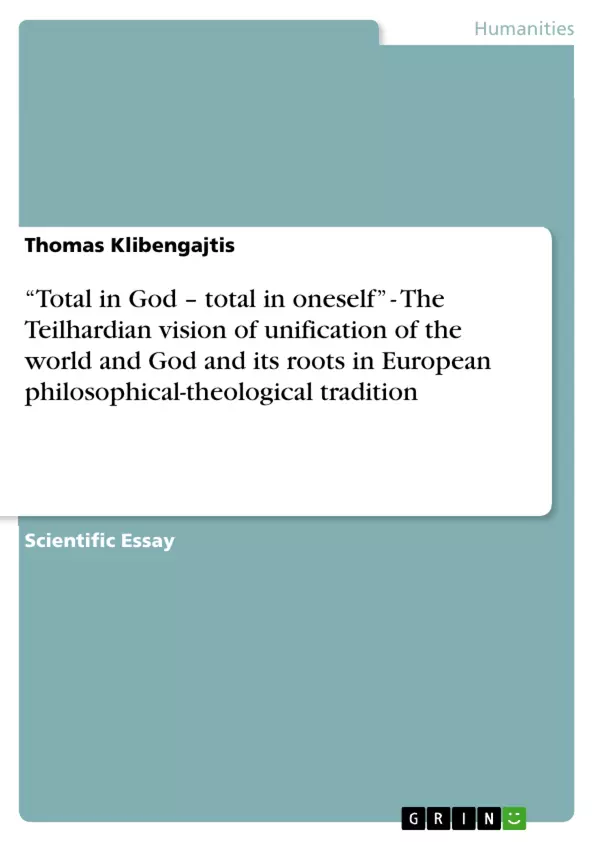The aim of the present article is to situate the Teilhardian vision of “unification of all in Christ” (Eph 1,10) – together with the resulting panentheistic, evolutionary and mystical premises within the European philosophical-theological tradition, which I would like to call the “unifying tradition”. In the first part of the article, I shall try to prove that the Teilhardian conception of the evolutionary development of all beings up to the point of Omega-Christ, generally understood as a departure from multitude (analysis) towards unity (synthesis), is a simple consequence of the philosophical-theological thought current that began with Parmenides, manifested itself in the thought of Platon, in Middle Platonism, in the conceptions of Plotinus, Nicholas of Cusa, Spinoza, Leibniz and in german idealism. The second part of the article presents the analogy between Teilhard de Chardin’s Christocentric and eschatological vision of evolution and the Christian conceptions of the emergence and return of all beings from and to God. These conceptions were present in varying scope and degree in the thought of the Greek Church Fathers (Clement of Alexandria, Origen, Cappadocian Fathers) and later Christian authors (Pseudo-Dionysus Areopagite, Maximus Confessor, Eriugena). The part’s final section will discuss whether Teilhard’s view on the animation or spiritualization of matter, which implies a lack of difference between ‘spirit’ and ‘body’, represents a novelty in Christian thought or whether this view can be inscribed into the current of an orthodox ‘unifying’ theory. The third part of the article shall consider the degree to which European conceptions of multitude in unity, panentheistic visions of Christian neo-Platonism and the conception of gradual spiritualization of everything presented among others by Teilhard de Chardin can be implemented in the intercultural and interreligious dialogue between Christianity and Asian peoples and religions, for whom the vision of animation and spiritualization of everything is surely a close one. In the article’s fourth and last part, I shall try to portray the practical implications arising from the ‘unifying tradition’, inscribed with Teilhard’s thought, for the moral and spiritual development of us all.
Inhaltsverzeichnis (Table of Contents)
- Introduction – Teilhardism as the exegesis of Eph 1,10
- The roots of Teilhard de Chardin's ideas in Western philosophical thought
- Parmenides
- Plato
- Middle Platonism
- Plotinus, Nicholas of Cusa, Spinoza, Leibniz and German Idealism
- The roots of Teilhard de Chardin's ideas in Eastern Christian thought
- The intercultural and interreligious implications of Teilhard's philosophy
- The practical implications of Teilhard's philosophy for our moral and spiritual development
Zielsetzung und Themenschwerpunkte (Objectives and Key Themes)
This article aims to examine the Teilhardian vision of "unification of all in Christ" (Eph 1,10) within the European philosophical-theological tradition. It explores the roots of this vision in the "unifying tradition" starting with Parmenides and extending to German Idealism. The article also investigates the parallels between Teilhard's Christocentric and eschatological vision of evolution and the Christian conceptions of the emergence and return of all beings from and to God. Finally, it considers the implications of Teilhard's philosophy for intercultural and interreligious dialogue and our moral and spiritual development.
- The Teilhardian vision of "unification of all in Christ"
- The "unifying tradition" in European philosophical-theological thought
- The parallels between Teilhard's vision of evolution and Christian conceptions of creation and return
- The intercultural and interreligious implications of Teilhard's philosophy
- The practical implications of Teilhard's philosophy for our moral and spiritual development
Zusammenfassung der Kapitel (Chapter Summaries)
The introduction examines the biblical fragment Eph 1,10 and presents Teilhard's conception of "unifying creative action" as its in-depth exegesis. The following section delves into the roots of Teilhard's ideas in Western philosophical thought, starting with Parmenides and his concept of an a-priori organizing principle. It then explores the contributions of Plato, Middle Platonism, and later thinkers such as Plotinus, Nicholas of Cusa, Spinoza, Leibniz, and German Idealism. The article further examines the influence of Eastern Christian thought on Teilhard's vision, referencing figures like Clement of Alexandria, Origen, the Cappadocian Fathers, Pseudo-Dionysus Areopagite, Maximus Confessor, and Eriugena.
Schlüsselwörter (Keywords)
The main keywords of this article include: Teilhard de Chardin, unification, Christ, "unifying tradition," European philosophical-theological thought, Parmenides, Plato, Middle Platonism, Plotinus, Nicholas of Cusa, Spinoza, Leibniz, German Idealism, Christian neo-Platonism, Eastern Christian thought, Clement of Alexandria, Origen, Cappadocian Fathers, Pseudo-Dionysus Areopagite, Maximus Confessor, Eriugena, intercultural and interreligious dialogue, moral and spiritual development.
- Arbeit zitieren
- Dr. Thomas Klibengajtis (Autor:in), 2006, “Total in God – total in oneself” - The Teilhardian vision of unification of the world and God and its roots in European philosophical-theological tradition, München, GRIN Verlag, https://www.hausarbeiten.de/document/190858


